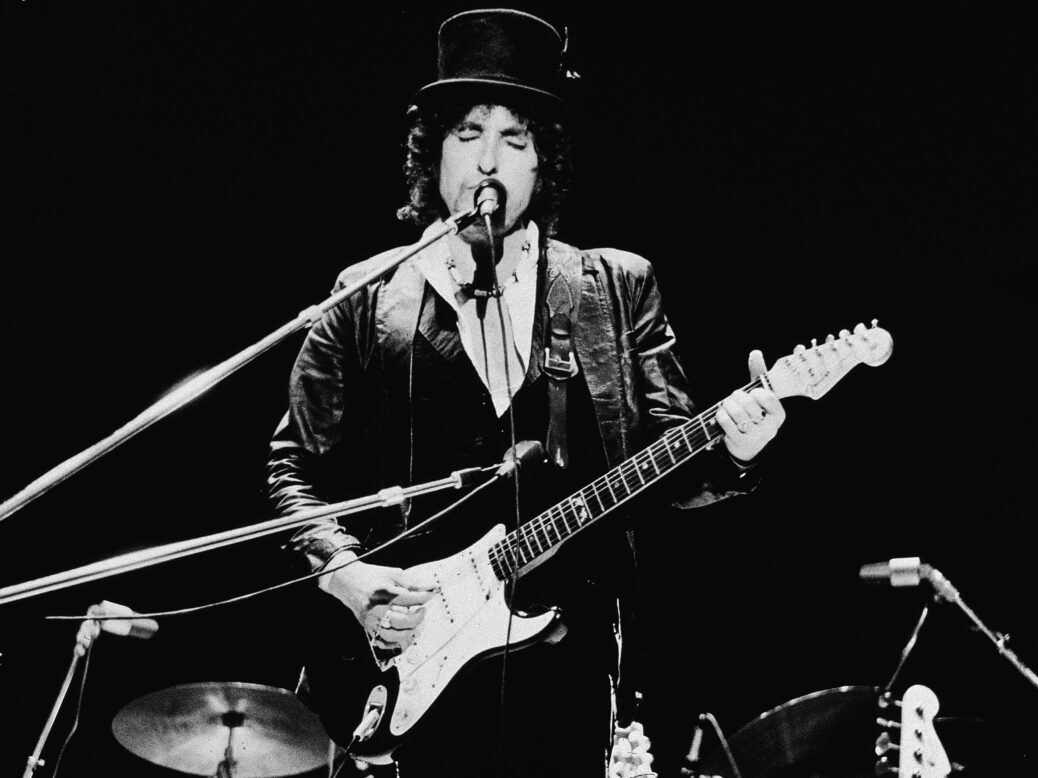
I was too young to appreciate the arrival of Bob Dylan in 1962. My generation screamed for the pop music pin-ups of the Seventies such as the Osmonds and David Cassidy. My refusal to do so made me something of an oddity at my North London comprehensive. It wasn’t until 1976, when he released his bestselling album, Desire, that Dylan’s growly tones began to catch the imagination of my contemporaries, but I’d been a fan since the late 1960s. His former girlfriend, the folk singer Joan Baez, was my entrée: I learned to play guitar from her records on which I first encountered such magisterial Dylan songs as “A Hard Rain’s a-Gonna Fall” and “With God on Our Side”, which I never did master.
I knew “Blowin’ in the Wind” of course: written in 1963 and a hit for the group Peter, Paul and Mary first, it was already part of our cultural DNA, so too was the 1965 hit single “Mr Tambourine Man”. Soon I would discover songs such as “The Times They Are a-Changin’” and “Like a Rolling Stone” whose lyrics are now part of our lingua franca, paraphrased by headline writers around the world.
The man who was born Robert Allen Zimmerman in Duluth, Minnesota was today awarded the Nobel Prize for Literature. Some will carp (why not Philip Roth or Salman Rushdie, or Alice Waters?), but most will agree it is an honour long overdue —and perhaps fitting that it be awarded now, in his seventy-fifth year. That his best work is behind him matters not. His last truly great album was in 1975, Blood on the Tracks, its songs full of the pain of divorce. There have been flashes of brilliance since (Oh, Mercy, 1989; Time Out of Mind, 1997) but none compares to the genius (a word not used lightly) of the handful of albums Dylan made between his debut in 1962 and the motorcycle crash of July 1966 that allowed him to escape the drug-fuelled craziness and retreat to his lie low at his home in Woodstock.
Christopher Ricks, Philip Larkin, Kenneth Rexroth are among the many scholars and poets who have found much to admire in Dylan. Writing in the New Statesman on 22 May, 1964, under his pseudonym of Francis Newton, the historian Eric Hobsbawm observed that song had given Dylan “the courage of speech; folk song a vocabulary, a sense of form, and at the same time… a moral frame.”
Homer and Orpheus were buskers and Dylan is their modern equivalent — the young man who took poetry off the bookshelves and put it on the jukebox. There can be no arguing that he changed the course of popular music. Not for him the “moon/June” rhymes of 1950s songwriters turning out bubble-gum kitsch. Shakespeare, Eliot, Lorca, Rimbaud, Steinbeck, Guthrie and the Bible were his touchstones. Dylan was the first singer-songwriter, his songs too long for a 45 rpm single. He inspired the Beatles. He wrote for the wronged and the dispossessed, about injustice and war, about love and revenge in songs that were sometimes simple and direct (“Blowin’ in the Wind”) but at the same time profound and mysterious:
Far between sundown’s finish an’ midnight’s broken toll
We ducked inside the doorway, thunder crashing
As majestic bells of bolts struck shadows in the sounds
Seeming to be the chimes of freedom flashing
Flashing for the warriors whose strength is not to fight
Flashing for the refugees on the unarmed road of flight
An’ for each an’ ev’ry underdog soldier in the night
An’ we gazed upon the chimes of freedom flashing
Robert Shelton, the journalist whose New York Times review is credited with launching Dylan’s career, believes “Chimes of Freedom” (1964) is at once his greatest love song and his most political song. Its compassion and humanity moves me still. Dylan voiced our grievances and our grieving and still does today.
I first saw Dylan in 1978 at Earls Court and then at the Blackbushe festival, which took place at a disused airport in Surrey, concerts that live on still in my mind’s ear. The following year I encountered Shelton, living in London and working on his long-promised Dylan biography, eventually published in 1986. Shelton, who died in 1995, had planned a serious study of a man in the great cultural pantheon but various editors had wanted a rock ‘n’ roll kiss ‘n’ tell. I was privileged to revisit his original text for a director’s cut, published for Dylan’s 70th birthday, and I was gratified that critics understood what publishers had not.
I was also privileged to meet Dylan. It was at the Hammersmith Apollo and I stood in the wings as Dylan played “Like a Rolling Stone” and “All Along the Watchtower”. I kept thinking I must be hallucinating, but it was real. In his dressing room we chatted for about 15 minutes: he talked about his memoir, which had started life as CD liner notes (“Once I started writing, I couldn’t stop, and you know those things are always too small to read at the best of times”) and remembered Shelton fondly. He was gracious and polite.
Dylan could have died in 1966 and still be worthy of the Nobel Prize for Literature and anyone who says otherwise should listen – really listen – to those milestone Sixties albums. “White heat of inspiration” doesn’t begin to describe them.
Liz Thomson is the editor of Conclusions on the Wall: New Essays on Bob Dylan (1980), co-editor of The Dylan Companion (Da Capo, revised edition 2000) and the revising editor of Robert Shelton’s No Direction Home: The Life and Music of Bob Dylan (2011).





